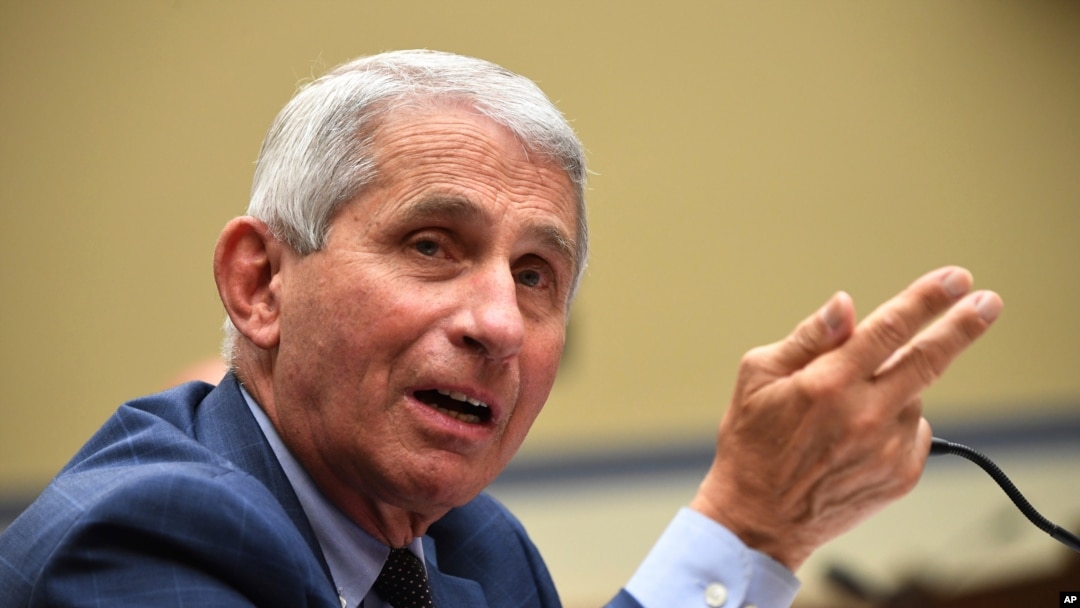America’s top infectious disease expert, Dr. Anthony Fauci, said Wednesday that AstraZeneca’s suspension of final global trials of its COVID-19 experimental vaccine points to the effectiveness of the safeguards that have been incorporated into the trials.
“It’s important to point out that that’s the reason why you have various phases of trials, to determine if, in fact, these candidates are safe,” Fauci said in an interview with “CBS This Morning.”
“It’s really one of the safety valves you have on clinical trials such as this.”
The British-Swedish pharmaceutical giant paused the trials because a volunteer participant became ill after receiving the experimental drug.
“It’s unfortunate that it happened, and hopefully they’ll be able to proceed along with the remainder of the trial,” Fauci said. “But you don’t know. They need to investigate it further."
The company issued a statement Tuesday saying the pause in testing is a “routine action, which has to happen whenever there is a potentially unexplained illness in one of the trials, while it is investigated, ensuring we maintain the integrity of the trials.”
AstraZeneca developed the vaccine, AZD1222, in cooperation with Britain’s University of Oxford. The vaccine is being tested in large-scale Phase 2 and Phase 3 trials in several nations, including the United States, Britain, Brazil, South Africa and India. AZD1222 is one of three COVID-19 vaccines in late-stage Phase 3 trials in the United States.
Watch related video by Henry Ridgwell:
Your browser doesn’t support HTML5
Coronavirus Vaccine Trial Halted After Participant Falls Ill
The company did not disclose the nature of the participant’s illness, but The New York Times reports the volunteer, based in Britain, was diagnosed with transverse myelitis, an inflammatory syndrome that affects the spinal cord and is often sparked by viral infections. But the Times said it is unknown whether it is directly linked to the AZD1222 vaccine.
Hours before announcing the pause of its COVID-19 vaccine testing, AstraZeneca joined eight other drug makers in pledging not to seek approval from U.S. government regulators for any vaccine until all data showed it was safe and effective.
The chief executive officers of the nine companies, which include Johnson & Johnson, Merck, Moderna and Novavax, as well as those heading two joint vaccine projects, Pfizer and BioNTech, and Sanofi and GlaxoSmithKline, issued a statement promising they would “only submit for approval or emergency use authorization after demonstrating safety and efficacy through a Phase 3 clinical study that is designed and conducted to meet requirements of expert regulatory authorities,” including the U.S. Food and Drug Administration.
The executives said they would “always make the safety and well-being of vaccinated individuals our top priority.”
The unusual joint pledge was aimed at alleviating growing fears by health experts that pharmaceutical companies are under considerable political pressure to quickly develop and introduce a COVID-19 vaccine. U.S. President Donald Trump has repeatedly suggested that a successful vaccine could be ready before Nov. 3, the date of the presidential election.
But Moncef Slaoui, Trump’s top vaccine adviser and co-director of the administration’s “Operation Warp Speed” initiative, which is funding many of the efforts to develop, test and manufacture a potential vaccine, told National Public Radio (NPR) last week that it is “very unlikely” a vaccine would be authorized before Election Day.
The United Nations is warning that the pandemic could reverse decades of advances in reducing preventable childhood deaths.
A new report by three U.N. agencies — UNICEF, the World Health Organization, and the Population Division of the U.N. Department of Economic and Social Affairs — and the World Bank Group says there were just over 5 million preventable deaths in 2019, compared to 12.5 million in 1990.
But the report also found that 68% of respondents across 77 countries reported at least some disruption in children’s physical checkups and vaccinations. Much of the disruption is due to parents’ fears that their children will be infected with the virus.
“The global community has come too far towards eliminating preventable child deaths to allow the COVID-19 pandemic to stop us in our tracks,” UNICEF Executive Director Henrietta Fore said in a news release.
“When children are denied access to health services because the system is overrun, and when women are afraid to give birth at the hospital for fear of infection, they, too, may become casualties of COVID-19,” Fore said.
People queue to take a COVID-19 test at a walk-in test facility in Bolton, Britain, Sept. 7, 2020.
The pandemic also continues to affect ordinary activities around the globe. British Prime Minister Boris Johnson is expected to issue an order Wednesday limiting the number of people taking part in most social gatherings to six, from the current 30.
The new limit, would take effect next week, as Britain is enduring a surge of nearly 3,000 new daily COVID-19 cases in recent weeks, the highest daily figure since May.
And officials in Los Angeles County, California, have issued an order banning most Halloween activities, traditionally observed on Oct. 31. The banned activities include the traditional door-to-door “trick-or-treating,” when costume-clad children knock on doors to receive candy, and “trunk-or-treating,” a similar activity involving going from car to car. Indoor and outdoor events, including carnivals, festivals and “haunted houses” are also prohibited.
Los Angeles County officials said nearly 250,000 coronavirus cases had been recorded there, and 6,036 people died from the disease since the start of the pandemic.


